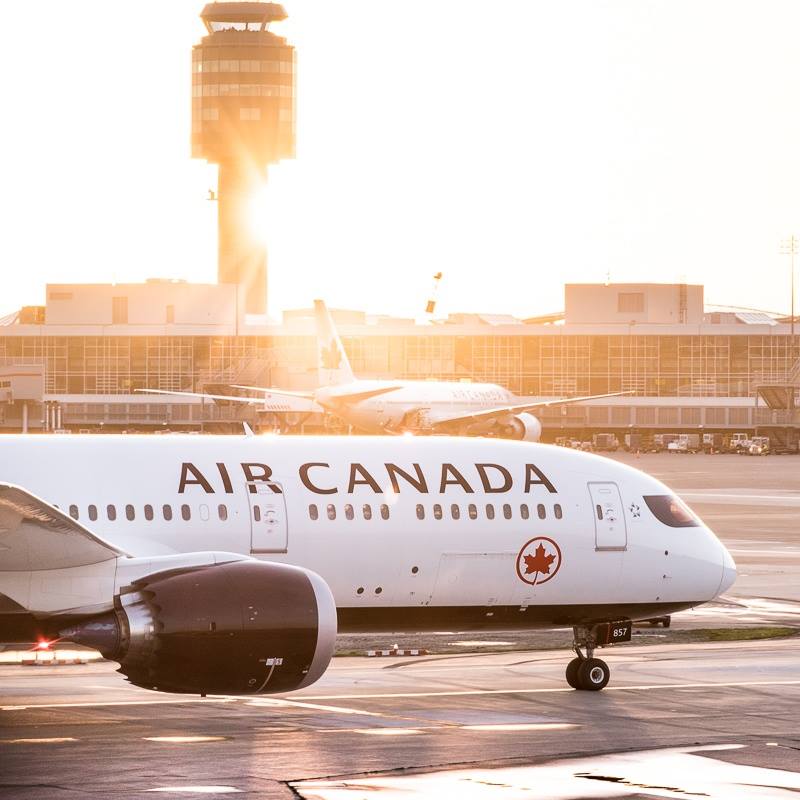Canada News
Air Canada says 737 Max grounding, coronavirus to hurt first quarter earnings

Last month, Air Canada halted all flights to mainland China and its Toronto-Hong Kong route due to the spread of COVID-19, a virus that has led to mass quarantines in China and caused more than 1,800 deaths. (File Photo: Air Canada/Facebook)
MONTREAL — Air Canada is bracing for a rough first quarter as the effects of the novel coronavirus and the continued grounding of its fleet of Boeing 737 Max jets bite into sales.
The company lost roughly 25 per cent of its narrow-body fleet after authorities around the globe banned the Max in March following two fatal crashes. Last month, Air Canada halted all flights to mainland China and its Toronto-Hong Kong route due to the spread of COVID-19, a virus that has led to mass quarantines in China and caused more than 1,800 deaths.
The dual blows mean adjusted earnings in the first quarter of 2020 are expected to generate about $200 million less than a year earlier, or about one-third lower than the $583 million in earnings before interest, taxes, depreciation and amortization (EBITDA) in the first three months of 2019.
“Certainly the biggest, largest item is the absence of the Max. And certainly there is some impact from not flying to China for two months of Q1,” said chief financial officer Michael Rousseau.
Extra costs stem partly from backfilling one of Air Canada’s most efficient aircraft with Embraer 190s and Airbus A320s, which have lower fuel economy and carry lighter loads. The expense of leasing those planes and paying about 400 Max pilots who are not trained to fly other jets in the fleet adds to the burden.
Air Canada hopes to start reintroducing Maxes late in the third quarter, though it will not receive all 26 Max 8s it was slated to have on the tarmac by this summer — on top of the 24 now sitting in hangars — until well into next year, the company has said.
Air Canada routes connecting Beijing and Shanghai to Toronto, Vancouver and Montreal comprise about six per cent of its available seat miles, a metric that measures an airplane’s revenue-generating carrying capacity. The Hong Kong-Toronto route makes up between one per cent and two per cent, Rousseau said.
Air Canada forecasts the routes — suspended through March at the moment — will be active again with normal ridership by the third quarter, based on analyses of previous epidemics.
“The analysis is imperfect because each one of these viruses is different than the last,” chief executive Calin Rovinescu said on a conference call with analysts.
“While we certainly appreciate the amount of anxiety that there is out there now, especially in China, we’ve seen other of the Asian markets still being relatively strong at this stage, not seeing them fall off a cliff…We’re hopeful that that continues.”
The deadly virus also had “massive implications” for schedule changes and last-minute rebookings, said senior executive Lucie Guillemette.
The slew of cancellations and new bookings in the past three weeks compounded problems arising from a new booking system — launched exactly three months before the earnings call — that continues to give customers headaches following a hectic holiday travel season.
“Our call centre wait time is still long,” said senior executive Lucie Guillemette. “We did see some revenue impact as a result.”
The revenue hit resulted not from a reservation system that hampered bookings, but because “we chose to waive some of the fees in order to reduce some of the friction for our customers,” she said.
The airline introduced the reservation system on Nov. 18, triggering a barrage of social media complaints from passengers who had difficulty accessing their booking information or reaching customer service agents.
“The introduction of a new reservation system, something we last did 25 years ago, is tantamount to a heart and lung transplant for an airline,” said Rovinescu, stating that “residual effects” are a given.
Air Canada forecasted an adjusted earnings margin of 19 per cent for 2020, yielding a slight bump in adjusted earnings from last year’s $3.64 billion and nearly five per cent below consensus, according to RBC Dominion Securities analyst Walter Spracklin.
The outlook came as the Montreal-based company reported fourth-quarter results that came up short of analyst predictions.
Profits of $152 million or 56 cents per diluted share fell 57 per cent below expectations, according to financial markets data firm Refinitiv. They compared favourably, however, with a net loss of $360 million or $1.33 per diluted share in the fourth quarter of 2018.
Colin Cieszynski, chief market strategist at SIA Wealth Management, called the results “disappointing,” though others viewed the recent turbulence as short-term.
“These are temporary events and the company is in an excellent balance sheet position to weather the associated impact,” Canaccord Genuity analyst Doug Taylor said of the Max grounding and COVID-19 epidemic.
The fourth quarter of 2019 included foreign exchange gains of $92 million while the last three months of 2018 included foreign exchange losses of $444 million.
On an adjusted basis, Air Canada says it earned $47 million or 17 cents per diluted share in the fourth quarter of 2019 compared with an adjusted profit of $55 million or 20 cents per diluted share in the fourth quarter of 2018.
Analysts on average had expected an adjusted profit of 38 cents per share for the quarter, according to Refinitiv.
Operating revenue totalled nearly $4.43 billion, up from nearly $4.23 in the same quarter a year earlier.
Full-year revenue rose six per cent year over year to $19.13 billion and full-year net income increased exponentially to $1.48 billion from $73 million in 2018.





















